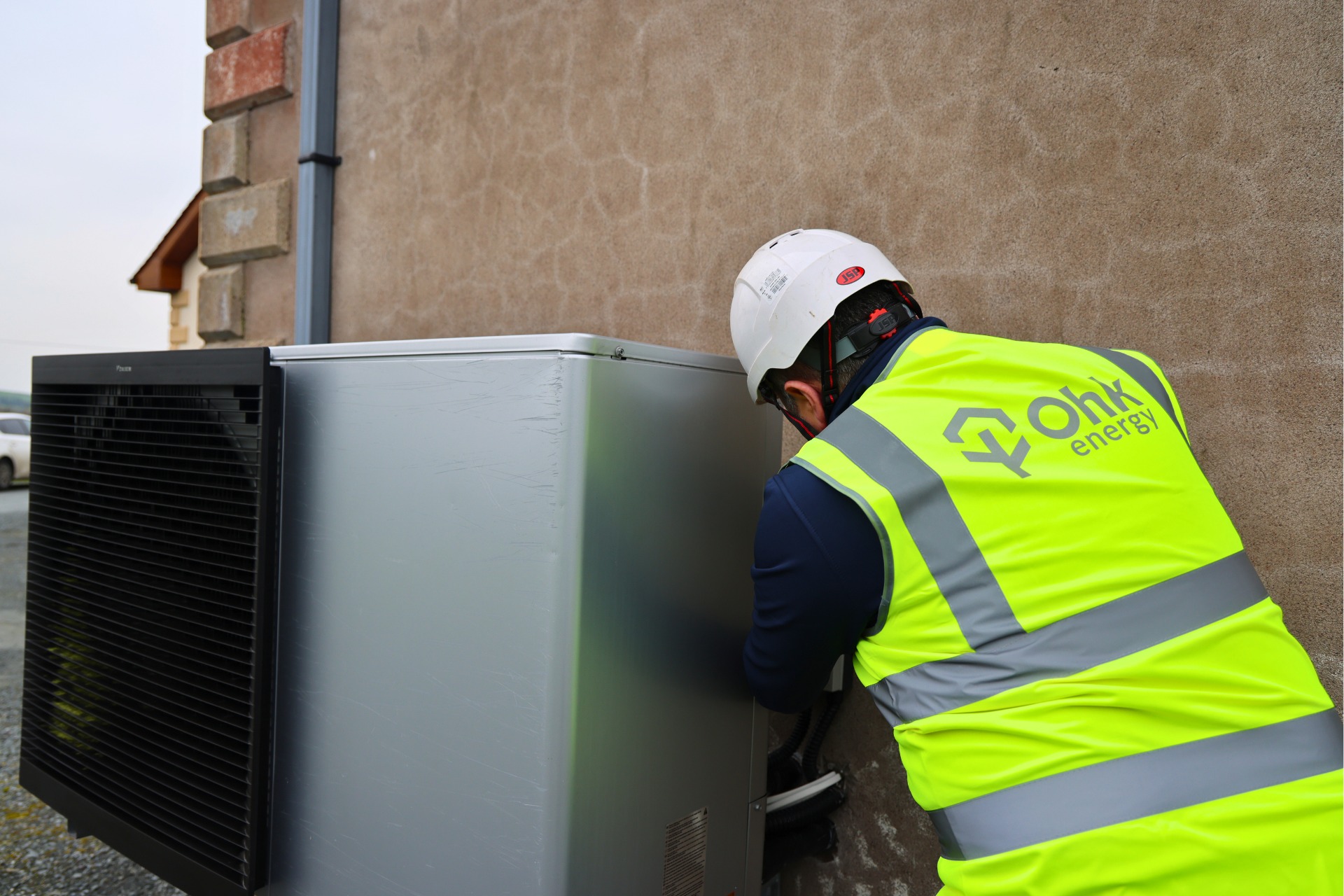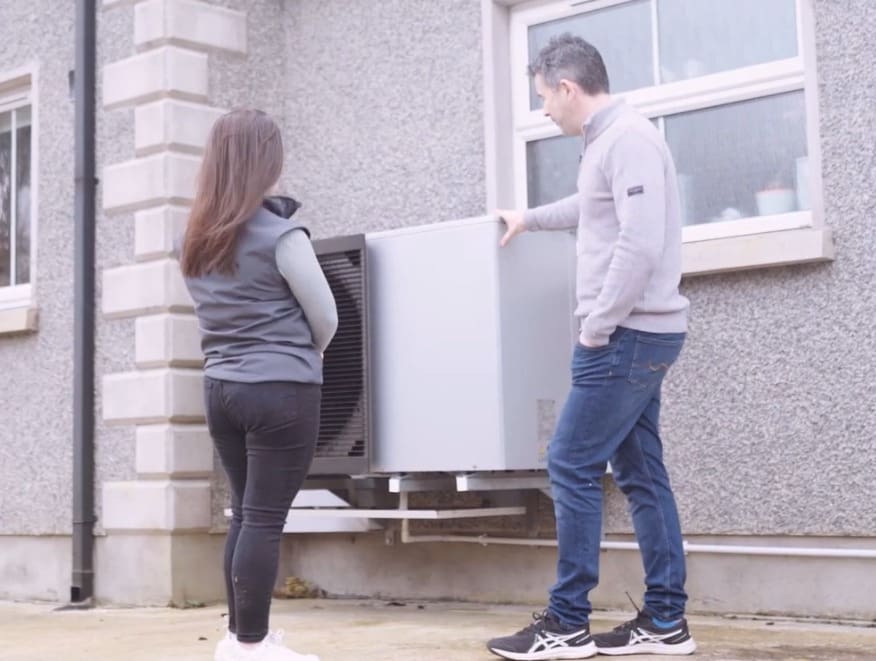
(This article was originally written by, and published on, nrgpanel.ie before NRG Panel became part of the Ohk energy Group)
Are you thinking about changing your heating system and considering a heat pump?
It’s not surprising.
More and more people in Ireland are looking for a clean and efficient way to heat their home that avoids nasty fossil fuels. This has led to an increase in the popularity of heat pumps.
Air to water heat pumps typically cost between €13,000 and €17,000, including installation. Costs can be reduced by up to €6,500 with an SEAI grant.
It is worth noting that a heat pump has a higher installation cost than a conventional boiler. However, a heat pump offers a more energy-efficient way of heating your home and water, so it is the optimal investment long term – by choosing a heat pump you are also reducing your carbon footprint, increasing the value of your home, and eliminating toxic chemicals from our skies.
Related: Air To Water Heat Pumps vs Other Heating Systems.
Below we will cover everything from what a heat pump is, how it operates, who should install one and why and what brand you should choose to reap the Heat pump benefits.
A heat pump is an environmentally friendly and extremely energy-efficient alternative to electrical heaters, oil, gas, solid fuel and conventional home heating systems.
A heat pump takes energy from free renewable sources outside the home (such as the air, water or the ground) to heat the home and produce hot water.
A heat pump uses electricity to transfer heat from outside to warm your home, it works just like a refrigerator, except in reverse making the cool space cooler and the warm space warmer.
Some people may have heard of a heat pump without realising that there are several types on the market. The main types for domestic use are air sourced and ground sourced heat pumps.
An air to water pump comes in two systems. One is a monobloc, where the entire kit is in the outside unit, which runs back to a standard hot water cylinder inside the house. The other is a split system, with an indoor unit and an outdoor unit.
The indoor unit, about the same size as an American fridge-freezer, has a super-insulated thermal store for hot water. You do not need a separate hot water cylinder with a split system. If you are tight on space, the monobloc is a good option as you won’t need to sacrifice space for the internal unit.
Air to water heat pumps are the most popular systems in Ireland at the moment. The main reason for this is the lower installation cost and they are less disruptive to install. Air to water heat pumps have also improved in efficiency over the years and have almost caught up with ground to water heat pumps.
Ground to water heat pumps collect the heat stored in the ground and send this into your home through buried pipes to heat your radiators and water.
Although they are slightly more efficient than air to water systems, the return on investment (ROI) may not be as attractive due to the higher installation costs associated. You would need an adequate amount of space for the outdoor unit and excavation to insert piping and tubes underground.

There are lots of heat pump brands on the market, but with oil and gas boilers being phased out over the next few years many fossil fuel boiler manufacturers are turning to producing heat pumps to keep up with the trend.
Daikin are the leading manufacturer and supplier of heat pump equipment in Ireland. They have the perfect balance between efficiency, cost and warranties. Daikin is an excellent choice if your main goals are reliability, quality and affordability.
When it comes to deciding on a heat pump, it’s essential to do your research.
Always compare like with like.
They all have different specifications, efficiencies and warranties.
In a poorly insulated home heat pumps are less effective. They can waste energy and money.
However, in a well-insulated home, a heat pump can be up to 5 times more economical and energy-efficient than standard home heating systems.
Before installing a heat pump a detailed technical assessment, including a heat loss survey, should be completed.
This is essential to see if you are ready for a heat pump. If you have high heat loss values, we would not install a heat pump yet, we would advise you to upgrade things like windows, doors, wall insulation, etc., before considering a heat pump.
The goal of the heat pump is to keep the home at a constant comfortable temperature.
If you are losing the heat through poor insulation or single glaze windows, the heat pump will need to work harder to keep the home at the desired temperature.
Generally, we would only install a heat pump in a home with a heat loss value of 2.3 or lower. A technical assessment is also required by the SEAI for grant purposes.
This assessment measures the heat loss in your house. SEAI will not provide grants for homes where heat pumps will not run efficiently.
To be eligible for the grant, your home must be built, occupied with the electricity turned on prior to 2021. You must have a heat loss indicator of less than 2 and you must not have availed of a SEAI heat pump grant at the address in the past.
If you are successful in securing the grant and choose to proceed with installing the heat pump, you also can claim back €200 from SEAI for the cost of the technical assessment and €50 back for the cost of the BER.
There is a common misconception that a heat pump does not work with radiators at all. This stems from the fact that if your radiators are around 20 years old, the likelihood is that some are incorrectly sized or in bad condition, so you may need to replace them.
It is important to size radiators and your heating system before installing anything. Otherwise, you risk having a system that is overworking or underperforming. In any instance the heat pump installer should carry out a site survey to identify if a heat pump is compatible your current system.
Typically, a heat pump will work best with larger radiators or under floor heating because of their lower operating temperature requirements.
For a retrofit, most people will put the new indoor unit where their existing boiler or cylinder is. This is because the existing pipework is located here, meaning that it would be less disruptive and costly to install.
While an A-rated home is indeed highly energy-efficient, modern heat pump technologies are designed to be effective across various energy ratings.
Our products, including air to water heat pumps, are capable of significantly improving energy efficiency, reducing heating costs and contributing to a more sustainable home, even in properties with lower BER ratings.
Our expert technicians play a crucial role in ensuring the optimal performance of our products. They conduct thorough assessments and, as part of our commitment to efficiency, we would not fit a heat pump unless the heat loss was assessed before installation and the result was below 2.0 HLI (Heat Loss Index).
This helps ensure that the heat pump is tailored to the specific needs of your home, optimising its efficiency.
If you have specific questions about your home or would like more information about how our products can benefit your particular situation, do get in touch:
"*" indicates required fields